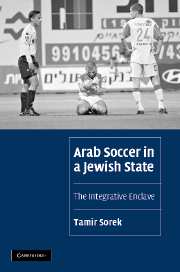Book contents
- Frontmatter
- Contents
- List of tables
- List of figures
- Preface and acknowledgments
- 1 Introduction
- 2 Sports, modernity, and struggle in Palestine
- 3 The emergence of the integrative enclave
- 4 Soccer and municipal “labor quiet”
- 5 “These points are Arab”: nationalist rhetoric in the sports press
- 6 “Maccabi Haifa is my flag”: Arab fans of Jewish teams
- 7 The Islamic Soccer League
- 8 Sakhnin – between soccer and martyrdom
- 9 Conclusion
- Appendix 1 Interviews with functionaries
- Appendix 2 Research design of the countrywide survey
- Appendix 3 Main findings from the countrywide survey
- Appendix 4 Research design of the survey in Sakhnin
- Appendix 5 Explanations for chapter 4
- Bibliography
- Index
- Cambridge Cultural Social Studies
2 - Sports, modernity, and struggle in Palestine
Published online by Cambridge University Press: 22 September 2009
- Frontmatter
- Contents
- List of tables
- List of figures
- Preface and acknowledgments
- 1 Introduction
- 2 Sports, modernity, and struggle in Palestine
- 3 The emergence of the integrative enclave
- 4 Soccer and municipal “labor quiet”
- 5 “These points are Arab”: nationalist rhetoric in the sports press
- 6 “Maccabi Haifa is my flag”: Arab fans of Jewish teams
- 7 The Islamic Soccer League
- 8 Sakhnin – between soccer and martyrdom
- 9 Conclusion
- Appendix 1 Interviews with functionaries
- Appendix 2 Research design of the countrywide survey
- Appendix 3 Main findings from the countrywide survey
- Appendix 4 Research design of the survey in Sakhnin
- Appendix 5 Explanations for chapter 4
- Bibliography
- Index
- Cambridge Cultural Social Studies
Summary
On December 24, 1917, less than two months after the historical Balfour Declaration in which Britain declared its sympathy for the Zionist project in Palestine, the well-known Jerusalemite educator Khalil Sakakini wrote in his diary: “The Power! The power! This is the new education that we should disseminate … the stronger will inherited the land” (Sakakini 1943: 117). Sakakini, who admired Friedrich Nietzsche and named him “the master of the philosophy of power in our era,” had founded eight years earlier an elitist, nationalist, and secular school that was the first Arab school in Palestine to include sports in its curriculum. His sporting education stressed martial arts such as boxing and wrestling, a reflection of Sakakini's perception of sports as a tool that prepares the nation for war (Sakakini 1943: 52).
Sakakini was a pioneer who represented the tendency of his socio-demographic milieu to assign a specific political role for sports. From the first decade of the twentieth century on, sports was a significant element in the conscious attempts of a secularized intellectual elite to construct an Arab (and later, Palestinian) national identity and in their self-appointed mission of “modernizing” Palestinian society. Gradually, this modernizing mission became a tool in the anti-colonial struggle against Britain and Zionism, and in this context, sports was assigned the double mission of nurturing muscular power for beating the enemy and serving as a viable representation of genuine Palestinian modernity.
- Type
- Chapter
- Information
- Arab Soccer in a Jewish StateThe Integrative Enclave, pp. 14 - 30Publisher: Cambridge University PressPrint publication year: 2007



